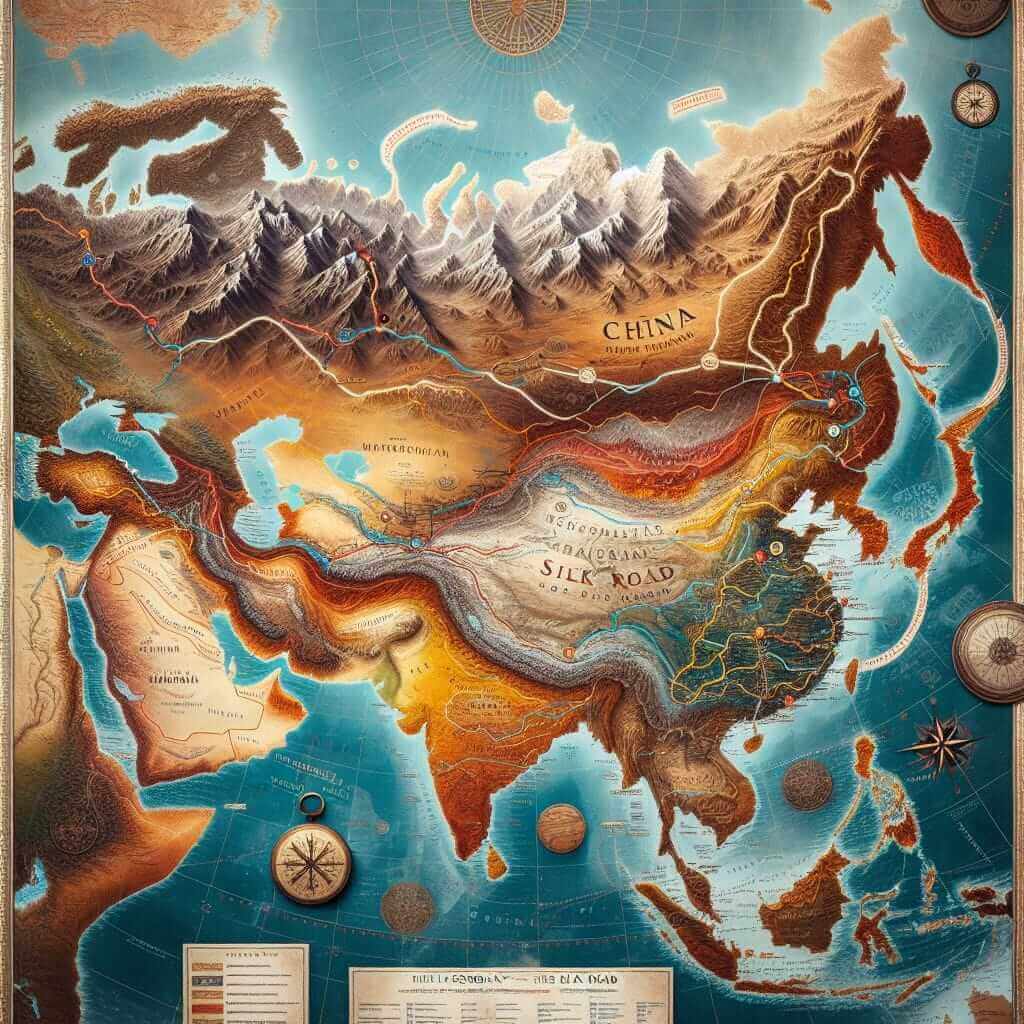The Reading section of the IELTS exam demands the ability to quickly comprehend passages and respond to various question formats efficiently. “Historical analysis of ancient trade routes and their impacts” is a pertinent and intriguing topic, shedding light on the trade networks of ancient civilizations and their influences on present-day society. The familiarity and depth of this subject make it a frequent choice in reading practice materials.
Understanding the historical significance of ancient trade routes can offer valuable insights into the global impact of these ancient networks, which could potentially be a topic in the IELTS Reading section. Historical themes often appear in IELTS reading tests, demanding a blend of comprehension, critical analysis, and vocabulary skills.
Reading Passage
Below is a passage structured according to the IELTS Reading format, falling under the Medium Text category to provide a balanced level of complexity for learners.
Historical Analysis of Ancient Trade Routes and Their Impacts
Ancient trade routes are a fascinating subject, revealing the expanse and richness of human history and interaction. The Silk Road, for instance, which spanned from China to the Mediterranean, was a significant network that facilitated the exchange of goods, cultures, and ideas. Equally, the trans-Saharan trade routes in Africa and the Indian Ocean Maritime System played pivotal roles in shaping the economies and societies of their respective regions.
The Silk Road is perhaps the most well-known of these trade routes. It not only carried silk from China to the West but also facilitated the transfer of knowledge, technology, and religious thought. The route was essential for the economic and cultural exchanges between the East and the West, fostering a unique period of intercultural dialogue and synthesis.
Similarly, the trans-Saharan trade routes connected sub-Saharan Africa to the Mediterranean. These routes were vital for the transport of gold, salt, and other valuable commodities that underpinned the wealth of African empires like Mali and Ghana. Additionally, these journeys enabled the spread of Islam, wildly influencing the cultural dynamics of the region.
The Indian Ocean Maritime System was a crucial part of the ancient global trade network. Unlike the terrestrial Silk Roads, this network utilized sea routes, connecting various civilizations across Asia, East Africa, and the Middle East. This extensive trade system was not only important for the movement of goods such as spices, textiles, and precious stones, but it also facilitated the exchange of ideas and technology, impacting societies across the Indian Ocean littoral.
These ancient trade routes’ impacts are evident even today. The globalization of commerce, the richness of multicultural societies, and the technological advancements owe significantly to these ancient networks. Understanding their history helps us appreciate the complexities and interconnections that have shaped our modern world.

Reading Questions
Questions 1-5: Multiple Choice
-
Which of the following is NOT mentioned as a benefit of the Silk Road?
A. Cultural exchange
B. Economic trade
C. Spread of religious ideas
D. Development of new trade routes -
The trans-Saharan trade routes primarily connected which regions?
A. China and Mediterranean
B. Sub-Saharan Africa and Europe
C. Sub-Saharan Africa and the Mediterranean
D. India and East Africa -
What was a major commodity transported on the trans-Saharan trade routes?
A. Spices
B. Silk
C. Gold
D. Tea -
The Indian Ocean Maritime System differed from the Silk Road primarily in its:
A. Use of sea routes
B. Exchange of religious ideas
C. Economic impact
D. Cultural significance -
Which civilization benefitted economically from the trans-Saharan trade routes?
A. Egyptian
B. Malian
C. Roman
D. Chinese
Questions 6-9: True/False/Not Given
-
The Silk Road exclusively facilitated trade between China and Europe.
True/False/Not Given -
The Indian Ocean Maritime System connected Asia, East Africa, and the Middle East.
True/False/Not Given -
Salt was a minor trade item on the trans-Saharan trade routes.
True/False/Not Given -
Modern globalization can be partially attributed to ancient trade routes.
True/False/Not Given
Answer Key
-
D. Development of new trade routes
-
C. Sub-Saharan Africa and the Mediterranean
-
C. Gold
-
A. Use of sea routes
-
B. Malian
-
False
-
True
-
False
-
True
Common Mistakes
- Misinterpretation: Confusing the primary commodities of different routes.
- Skimming and Scanning: Failing to identify key information and ideas due to insufficient skimming and scanning techniques.
- Time Management: Spending too much time on complex questions, leading to inadequate time for answering simpler questions.
Vocabulary and Grammar
Vocabulary
- Facilitated (verb) /fəˈsɪləˌteɪt/: to make an action or process easier.
- Intercultural (adjective) /ˌɪntərˈkʌltʃərəl/: relating to different cultures or comparison between them.
- Littoral (adjective) /ˈlɪtərəl/: relating to or situated on the shore of the sea or a lake.
- Commodity (noun) /kəˈmɒdəti/: a raw material or primary agricultural product that can be bought and sold.
Grammar Focus
- Relative Clauses: “The Silk Road, which spanned from China to the Mediterranean, was a significant network…”
- Passive Voice: “These routes were vital for the transport…”
Tips for Success in the IELTS Reading Section
- Practice Regularly: Familiarize yourself with different types of passages and question formats.
- Enhance Vocabulary: Focus on learning high-frequency academic words and technical terms.
- Skimming and Scanning: Develop techniques to quickly locate information within a passage.
- Time Management: Allocate time effectively to ensure all questions are addressed.
Consistent practice and strategic preparation will significantly enhance your reading skills and performance in the IELTS exam. For further learning on related topics, please visit our articles on the historical significance of ancient maritime trade and historical analysis of global pandemics.